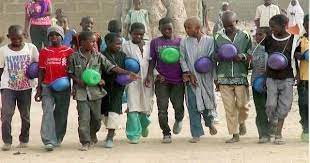Opinion
The Almajiri System in Northern Nigeria: Concerns And Solutions

|
Getting your Trinity Audio player ready...
|
The Almajiri System in Northern Nigeria: Concerns and Solutions.
By Bala Salihu Dawakin kudu
The Almajiri system, which originated as a form of Islamic education in Northern Nigeria, has evolved over the years into a complex social issue. Initially intended to provide religious education to young boys, the system has become synonymous with child poverty, illiteracy, and social neglect. This essay delves into the concerns surrounding the Almajirai issue, the problems it poses to Northern Nigeria, and potential solutions to address these challenges.
Poverty and Exploitation, majority of Almajirai are from poor backgrounds, sent by their parents to learn under Islamic scholars, or “Mallams.” However, due to the lack of resources and proper structure, these children often end up begging on the streets for food and money. This exposes them to exploitation, abuse, and a life of perpetual poverty.
Educational Deficit, While the Almajiri system was originally intended to provide religious education, many of these children miss out on a balanced education that includes literacy, numeracy, and other essential skills. This limits their future opportunities and perpetuates the cycle of poverty.
Almajirai often live in unsanitary conditions, lack access to proper healthcare, and are vulnerable to diseases associated with the system when many Almajirai were found in crowded, unhygienic conditions, posing a risk to public health.
The Almajirai system creates a class of young people who are often disconnected from mainstream society. Their isolation and lack of formal education can lead to difficulties in integrating into the broader community, and they may be more susceptible to radicalization and involvement in criminal activities.
The system perpetuates a cycle of poverty, as Almajirai grow up without the skills needed to secure decent employment. This leads to a reliance on begging or menial jobs, which are insufficient to break the cycle of poverty. The sheer number of Almajirai puts a strain on social services in Northern Nigeria. These children often rely on charity and informal support networks, placing an additional burden on communities that are already struggling with poverty and underdevelopment. The lack of education and social integration among Almajirai makes them vulnerable to manipulation by extremist groups. This has been a significant concern in Northern Nigeria, where radicalization and terrorism have been fueled by socio-economic inequalities and lack of opportunities.
A comprehensive reform of the Almajiri system is necessary. This should include integrating formal education with religious studies, ensuring that children receive a balanced education that equips them with the skills needed for modern life. The government should work with religious leaders to modernize the curriculum and ensure that Almajirai are not forced into begging. Addressing the root causes of the Almajirai problem requires tackling poverty at its core. The government and non-governmental organizations should implement targeted poverty alleviation programs that provide support to families, reducing the need to send children away to become Almajirai.
Providing vocational training and skill acquisition programs for Almajirai can help them gain practical skills that can lead to gainful employment. This would reduce their reliance on begging and open up new opportunities for self-sufficiency. But government should enforce child protection laws more rigorously, ensuring that no child is forced into a life of begging or exploitation. This includes holding parents and religious leaders accountable for the welfare of Almajirai under their care. Engaging communities in Northern Nigeria to understand the risks and consequences of the Almajiri system is crucial. Sensitization campaigns can help shift cultural perceptions and encourage parents to seek alternative educational opportunities for their children.
Collaborating with private sector organizations to fund and support education and vocational training programs can help scale efforts to address the Almajirai issue. These partnerships can also support infrastructure development, providing better living conditions for Almajirai. The Almajirai issue in Northern Nigeria is a multifaceted problem that requires a comprehensive and sustained effort to address. By reforming the system, tackling poverty, and providing alternative educational and vocational opportunities, Northern Nigeria can begin to alleviate the challenges associated with the Almajirai system. It is only through a collaborative effort involving government, religious leaders, communities, and the private sector that a lasting solution can be achieved, ensuring a brighter future for the next generation of Northern Nigerians.
Hon. Bala Salihu Dawakin kudu
Director General
Progressive Amalgamation of Northern Nigeria (PANN).
Phone number +2348060017934
Email, balasalihudawakinkudu@gmail.com







